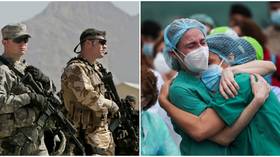To feel safe, does the world need more weapons or better healthcare? The coronavirus pandemic proves it’s the latter

The rapid proliferation of nuclear and conventional weapons post-Cold War indicates that governments continue to think of ‘security’ largely in military terms – but Covid-19 has exposed the fallacies in this way of thinking.
Evidently, for world leaders, military power is regarded as a vital instrument of state policy and many countries have amassed huge destructive arsenals in a bid to acquire greater control and bargaining power in their international relationships.
Yet, no amount of weapons can put a stop to a health pandemic of the kind we are witnessing with Covid-19. Indeed, it may be that we can only truly look after humanity if leaders begin putting basic human security (access to food, water, healthcare and clean environments etc.) before extravagant and wasteful levels of defense spending. If that does not happen, we will increasingly face new kinds of existential crises that even the fanciest new weapons will provide no defense against.
Also on rt.com Cutting military spending to fund human security is ‘THE LEAST’ world leaders can do after pandemic – GorbachevGrowing defence expenditure
Global military spending has reached its highest level since the end of the Cold War, according to the Stockholm International Peace Research Institute (SIPRI). Military expenditure worldwide topped $1.82 trillion in 2018 (up 2.6 percent on the year before), with those increases mainly driven by the United States and archrival China, which combined accounted for half of the global spend.
More broadly, the US and China, together with Saudi Arabia, India and France, accounted for 60 percent of the spending. SIPRI said regional tensions in Asia and rivalry between Washington and Beijing were “major drivers” of the growth.
The question we must ask ourselves is whether these massive levels of expenditure on ‘defense’ are actually making the world a safer place. Have they heightened our defenses in all the ways we need? Clearly not.
Covid-19, which has spread at an alarming pace, already taking 170,000 lives globally and plunging the world into economic crisis, has shown us how futile military power is in the face of this kind of crisis.
Sadly, and somewhat ironically, the top military spender, the US, has been the worst affected nation so far, topping the list of Covid-19 casualties and reporting almost 800,000 confirmed cases as of April 21. China, while it managed to contain the spread more successfully than many Western nations, is where the virus originated, proving again that no amount of new-age weapons matter in the face of a naturally occurring attacker like Covid-19.
Also on rt.com Will they bomb the pandemic to death? Even with the Covid-19 crisis, the US war machine ALWAYS wants more moneyIs the opportunity cost worth it?
If we look at the bare figures, we can see that actually the world spends two-and-a-half times more on healthcare than it does on militaries, according to SIPRI – but that statistic is highly misleading and “conceals major regional variations.”
A closer look reveals that while we spend more on healthcare at large, many countries still spend more on defense than health. For instance, India spends approximately five times more on defense than healthcare – and it is now playing catch-up as Covid-19 threatens to overwhelm its creaking and underfunded system.
Surprisingly, Western and Central European countries which spend significantly more on healthcare have seen more cases of Covid-19 than some countries which spend more on defense – but a virus is an equal-opportunity killer and its spread doesn’t depend on pre-existing political factors. It’s another reminder that in a global crisis like this, even with a robust healthcare budget in place, countries can’t be entirely crisis-proof and global problems must be tackled collectively.
What we can clearly say, however, is that the overall ‘opportunity cost’ involved with outsized military spending is unaffordable and prevents us from equipping ourselves to deal effectively with problems that the 21st century will bring. To do that, the world as a whole must divert some of this spending to more civilian-focused programs.
In this context, the US decision to halt funding to the World Health Organization (WHO) during a global pandemic is clearly imprudent, despite the organization’s much-discussed shortcomings. In fact, if ever there was a good time to divert more funding to international organizations like the WHO and other UN-sponsored agencies, this is it. If they are suffering from a lack of efficiencies now, we must work to make them better.
Also on rt.com Pentagon suddenly wants to keep its future spending plans secret — but it needs more oversight, not lessTo put this all in perspective, a 2015 SIPRI study found that just 13 percent of global military spending could eliminate extreme poverty and hunger by 2030 – a staggering statistic. Providing quality primary and early secondary education universally by 2030 would require only 3.2 percent of the global defense budget.
Broadly speaking, most of the UN’s sustainable development goals – including on health, education, food security, water supply, sanitation, modern energy, transport infrastructure and climate change – could be done with half of the world’s defense budget.
Convincing world leaders to cut military spending seems like a colossal task, but this pandemic could perhaps be the turning point at which governments are forced to rationalize spending to people and redirect some of their focus to non-military goals. There is no doubt it would make the world a truly better place.
Like this story? Share it with a friend!
The statements, views and opinions expressed in this column are solely those of the author and do not necessarily represent those of RT.













